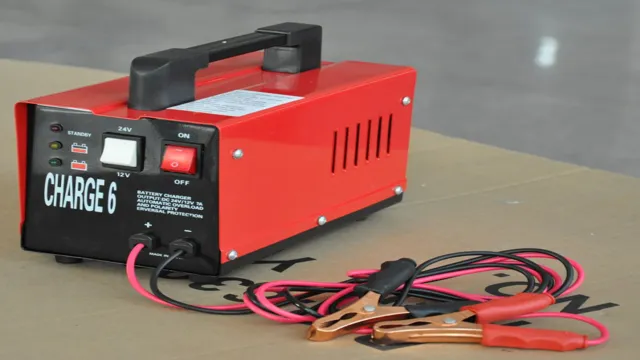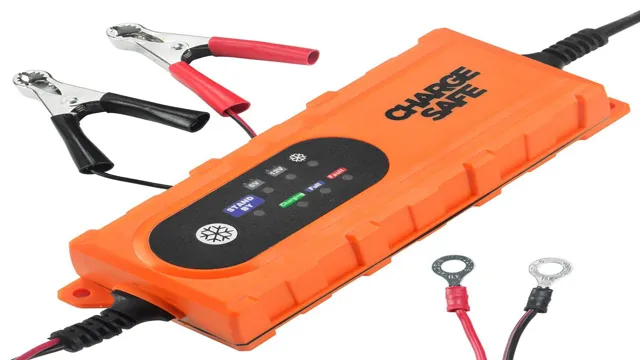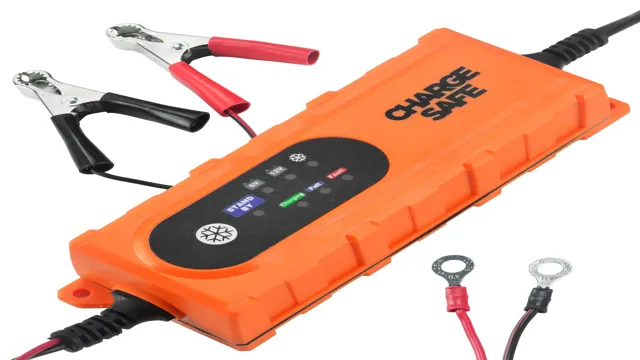What Car Battery Charger Do I Need? A Comprehensive Guide to Choosing the Right Charger
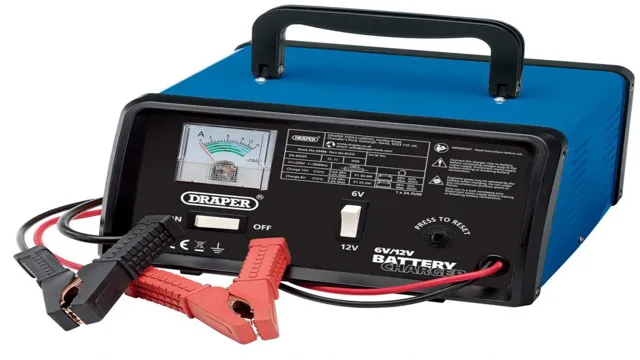
When it comes to maintaining our vehicles, there’s no doubt that few things are more important than the battery charger. Successfully charging your car battery may seem like a simple task. However, the process is not as easy as connecting the wires and expecting it to do its job.
Choosing the right car battery charger can be challenging when you have so many options in the market. What type of battery charger do you need and what factors should you consider? Finding the right answer to these questions can be overwhelming, but don’t worry! We have the answers to all your queries related to choosing the right car battery charger. Whether you’re a newbie or a seasoned professional, our guide will help you understand everything you need to look for in a quality charger to keep your car up and running.
So, sit back, relax, and let us help you navigate all the complexities of car battery chargers!
Type of Charger to Use
If you’re asking yourself, “what car battery charger do I need?” the answer depends on a couple of factors. One of the most important is the size and type of battery in your car. For example, a basic charger might work for a small car, but you’ll need a more powerful one for a larger vehicle or a heavy-duty truck.
Additionally, you’ll need to consider what kind of charging method you prefer. Some chargers can be connected directly to your car’s battery using alligator clips, while others require you to plug in an electrical outlet. Ultimately, your decision will come down to personal preference and your specific needs.
Just be sure to do your research, read product reviews, and choose a charger that’s been tested and certified for safety and performance.
Trickle Chargers
Trickle chargers are a great investment for anyone who wants to keep their vehicle’s battery charged when it’s not in use. These chargers work by slowly feeding a small amount of current to the battery over an extended period of time. They have a low voltage output that helps keep the battery from overcharging while providing enough power to keep it from discharging completely.
There are two main types of trickle chargers: manual and automatic. A manual charger must be monitored and turned off when the battery reaches a full charge, while an automatic charger will turn off on its own when the battery is fully charged. When deciding which type of charger to use, it’s important to consider how frequently the battery needs to be charged and how long it will be in storage.
Regardless of which type of charger you choose, using a trickle charger is an easy and effective way to ensure your vehicle’s battery stays charged and ready to go.
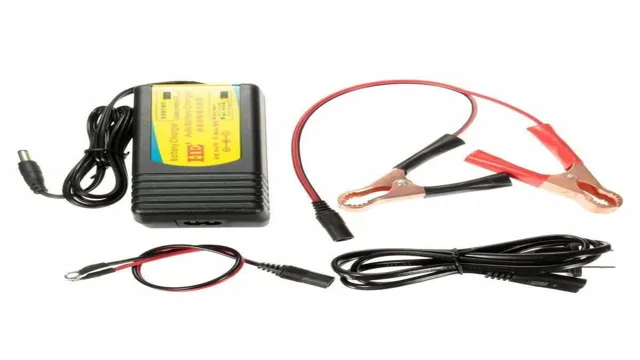
Smart Chargers
When it comes to charging your devices, it can be overwhelming figuring out which type of charger to use. However, a smart charger is always the best option. This charger is designed to prevent overheating and overcharging, optimizing the charge time and ultimately extending your device’s lifespan.
Additionally, smart chargers have the ability to adjust the charging rate based on your device’s needs. This means that it can charge your device efficiently and effectively, without causing any damage. By investing in a smart charger, you can ensure that your devices are always fully charged, while also protecting their battery health.
So, if you want to keep your devices running smoothly and avoid any damage caused by charging, a smart charger is the way to go.
Fast Chargers
When it comes to charging your electronic devices, choosing the right type of charger is essential. One of the best options for fast charging is using a USB-C fast charger. This type of charger can charge your devices up to 50% in just 30 minutes! Not only is it efficient, but it is also compatible with most newer devices such as smartphones and laptops.
Another benefit of USB-C fast chargers is that they use less power than other types of chargers, which makes them more energy-efficient. So, if you are looking for a fast charger that is eco-friendly and works with most of your devices, a USB-C fast charger is definitely worth investing in.
Consider the Battery Type
When it comes to choosing the right car battery charger, one of the crucial factors to consider is the type of battery in your vehicle. There are different types of car batteries – lead-acid, lithium-ion, and AGM batteries – and each requires a specific type of charger. While most chargers are versatile and compatible with different battery types, it’s important to check the specifications before purchasing.
The wrong type of charger can damage your battery or even pose a safety hazard. Furthermore, some chargers are designed to work better with particular battery chemistries than others, so make sure to do your research and choose a charger that meets your car’s needs. Ensuring that you have the right type of charger for your car battery can make all the difference in its longevity and overall performance.
So, if you’re wondering what car battery charger do I need, start by understanding the type of battery in your vehicle.
Lead-Acid Batteries
When considering the type of battery for your application, lead-acid batteries may be a good option. They are widely used and have been around for over 150 years, so they are a proven technology. They are also relatively inexpensive compared to other battery types and can be easily recycled.
However, it’s important to keep in mind that lead-acid batteries are not the most efficient and have a limited cycle life compared to other battery types. Additionally, they can be heavy and require regular maintenance. If you are looking for a more efficient and longer-lasting option, you may want to consider lithium-ion batteries.
Overall, it’s important to weigh the pros and cons of each battery type before making a decision.
Lithium-Ion Batteries
Lithium-ion batteries have become a popular choice in many electronic devices like smartphones, laptops, and electric vehicles. However, it’s important to consider the type of battery before making a purchase. While lithium-ion batteries are efficient and long-lasting, there are different types to choose from.
Some may prioritize power output over battery life, while others may be optimized for specific temperature ranges. It’s essential to take these factors into account to ensure the best performance for your device and to avoid potential safety issues like overheating or swelling. Therefore, before choosing a lithium-ion battery, consider your specific needs, including usage expectations and environmental factors.
A little bit of research upfront can go a long way in maximizing your device’s longevity and efficiency.
Consider the Amps
“What car battery charger do I need?” is a common question among car owners. One of the important factors to consider when choosing a car battery charger is the amps. Amps, or amperage, determine how quickly and efficiently the charger can recharge your battery.
The higher the amps, the faster the charging time. However, it’s important to choose a charger with amps that are appropriate for your battery size. For example, if you have a small car battery, a charger with too high amps could potentially damage the battery.
On the other hand, if you have a large battery, a charger with low amps may not be able to fully recharge it in a timely manner. So, before choosing a car battery charger, make sure to check your battery size and choose a charger with amps that are appropriate for it.
Determine the Battery’s Ampere Hour (Ah)
When it comes to determining the Ampere hour (Ah) of your battery, it’s important to consider the amps. The Ah is the amount of charge a battery can deliver over a specified period of time, usually measured in hours. To calculate the Ah, you need to know the amp output and how long the battery can deliver that output.
For example, a battery with an output of 5 amps that can last for 10 hours would have an Ah of 50 (5 amps x 10 hours). Understanding the Ah of your battery can help you determine how long it will last before needing to be recharged or replaced. It’s important to note that the actual Ah may vary depending on how the battery is being used, so it’s always a good idea to consult with the manufacturer’s specifications.
By considering the amps and calculating the Ah, you’ll have a better understanding of your battery’s capabilities and be able to make more informed decisions about its usage.
Select the Appropriate Amp Charge Rate
When it comes to charging your battery, it’s vital to select the appropriate amp charge rate. All batteries have a specific amp rating, which either means they can charge at a slower or faster rate. Generally, the higher the amp rating, the faster the charge time, but it’s essential to consider how fast you want your battery to charge without causing any damage.
Charging your battery at a higher amp than it can handle can reduce its lifespan and even create dangerous situations such as overheating or explosions. So, it’s vital to consider the amps and find the sweet spot for your battery’s optimal charging efficiency. By finding the right amp charge rate, you can ensure that your battery lasts longer, works more efficiently, and doesn’t damage your charger or device.
Remember, it’s not always about the fastest charge time, but about finding the right balance for your battery’s optimal functioning.
Conclusion
Choosing the right car battery charger is like finding the perfect partner – it needs to be reliable, compatible, and able to provide the necessary spark to keep things running smoothly. So, whether you’re looking for a quick charge or a slow and steady revival, make sure you do your research and find the charger that’s a match made in automotive heaven.”
FAQs
What is a car battery charger and how does it work?
A car battery charger is a device used to recharge a car’s battery when it has lost its charge. It works by converting AC power from an electrical outlet into DC power compatible with a car battery.
Can I use any car battery charger to charge my battery?
No, you cannot use any car battery charger to charge your battery. The charger you use must match the voltage requirements of your car’s battery and have the correct amperage to handle the charge rate.
How long does it take to charge a car battery with a charger?
The time it takes to charge a car battery with a charger depends on the charger’s amperage output and the battery’s size. On average, it can take 4-6 hours to fully charge a car battery.
What happens if I overcharge my car battery with a charger?
Overcharging a car battery with a charger can cause damage to the battery and shorten its lifespan. It can also cause the battery to leak and release dangerous gases.
How do I know if my car battery needs to be charged?
If your car struggles to start or the headlights seem less bright than usual, your car battery may need to be charged. You can also use a voltmeter to check the battery’s voltage level.
Are there any precautions I should take when using a car battery charger?
Yes, you should always read the instructions that come with your charger and follow them carefully. You should also wear protective gear such as gloves and goggles and never touch the charger’s clamps while it’s in use.
Can I leave my car battery connected to the charger overnight?
It’s not recommended to leave your car battery connected to the charger overnight as it can cause overcharging and damage the battery. It’s best to disconnect the charger once the battery is fully charged.
